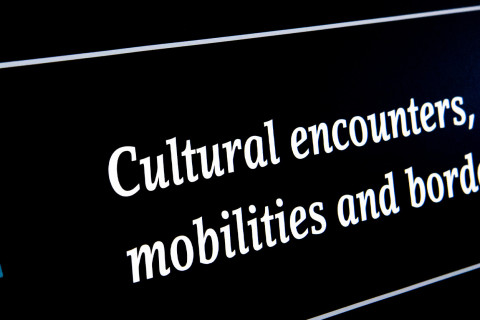- Kielet ja kulttuurit
- Alkamispäivä:
-
8:00
- Päättymispäivä:
-
16:00
- Tapahtumapaikka:
-
Joensuun kampus, Agora-rakennus
- Lisätietoja:
-
Yliopistokatu 4
- Lisää kalenteriin:
The MESEA 2024 conference invites contributions that address the diverse layers, definitions, and ‘pathways’ of mobility, including the mobility of people from one place to another, crossings and intersections of cultures, and the formation of hybrid cultural forms. At the same time, mobility, border-crossings, and migration move people emotionally, either directly or through a wide range of cultural representations, and generate various emotional responses ranging from joy and relief to fear, loss and frustration. Affecting both those who travel, those who stay, and those encountered when journeying, such experiences are personal and collective, local and global, theoretical and empirical, and reveal the perplexing nature of mobility, whether this is voluntarily or involuntarily ventured.
This conference aims to look into the pluriform contact zones that form with regard to global mobility, and to further explore the ways migration affects experience in diverse ethnic and postcolonial contexts. We seek to examine questions such as:
- How does mobility from the perspective of affect and lived experience shed light on the variety of modes and genres of (post-)migrant experiences?
- How are the experiences of displacement, forced migration, and other conditions of unfreedom represented in narrative?
- How are narratives of mobility and migration formed and articulated historically?
- To what degree do narratives of mobility contribute to the formation of transnational and translocal communities, and which narratives in various affective registers circulate within them?
- In what ways are individual and collective memories of mobility (re)framed emotionally, for instance through expressions of melancholy, dissociation, grief, or vulnerability?
- How is the crossing of cultural borders and transculturation articulated in world literature, film, and performance art?
- What kind of emergent and/or alternative cultural practices are connected with mobility? How do they challenge dominant notions of identity and belonging?
The 2024 MESEA Conference seeks to explore the diversity of the phenomenon in the nexus of culture, history, borders, and geopolitics. Potential paper and panel submissions can address but are not limited to topics such as follows:
- nostalgia and narratives of return
- narratives of forced migration, human trafficking, deportation, and transportation
- trauma, displacement, and emplacement
- Gothic journeys and uncanny spaces
- tragedy, comedy, melodrama, and other genres of migration narratives
- mourning, melancholia, and migration
- activism, solidarity, consciousness raising
- autobiography and memory
- transforming and hybridizing cultural practices and texts
- cosmopolitanisms
- climate migration/mobility
- home(-making) in migration
- border communities
- rebordering and debordering
- gendered perspectives on mobility
- the ethics and economics of migration
- migration as an opportunity.
Abstracts should be submitted to our website between August 15 and November 15, 2023. Submitters will receive notification of acceptance by January 10, 2024.
Preference will be given to complete panel proposals with an inter/transdisciplinary and/or transnational focus. Panels may not include more than 2 participants from the same institution. Presenters are expected to be members of the association in 2024. MELUS members can also present their papers at the conference. Previous MESEA Conferences have led to high quality publications.
Please see MESEA 2024 conference web pages in the address https://mesea.org/joensuu-2024/ also for all updating information.
As in previous years, MESEA will award at least one Young Scholars Excellence Award.
The conference will be arranged as an onsite conference at Joensuu Campus.
MESEA wishes you heartily welcome to a further exciting event!
For more information, please contact Professor Jopi Nyman, email [email protected].
